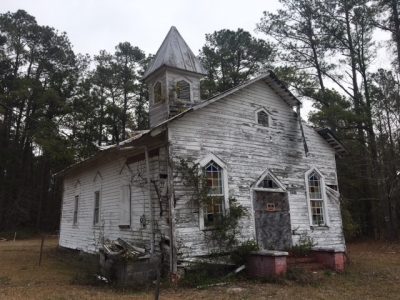NAVASSA – The effort to save Reaves Chapel African Methodist Episcopal Church, which is considered a culturally and historically significant structure, has reached an important milestone with the recent purchase of the property for conservation.

The Coastal Land Trust and the Cedar Hill/West Bank Heritage Foundation announced Monday the trust’s purchase of Reaves Chapel using a grant from the Orton Foundation.
Supporter Spotlight
The chapel was built along the Cape Fear riverfront shortly after the Civil War by formerly enslaved people of Cedar Hill Plantation. The original congregation had farmed the former plantation property and other neighboring rice plantations.
According to the trust, when Mount Misery and Cedar Hill roads were built and roads had replaced the river as the main mode of transportation, the congregation in about 1922 used logs and a team of oxen to move the church from the riverfront to its present location on Cedar Hill Road. The property was given to the church by Edward Reaves, the church’s namesake.
“This was our community church,” Al Beatty, president of the nonprofit Cedar Hill/West Bank Heritage Foundation, said in a statement. “Everyone in the community went to church there. Major groups came there to perform. A revival would bring in 80 – 100 people. If somebody died, they rang the church bell,” he added.
The bell, incidentally, still hangs in place in the church tower.
The church had an active congregation until about 1995, when the church matriarch, Aurelia Gertrude Weston, died. Since then, time and weather have taken a toll on the building.
Supporter Spotlight
“Navassa Mayor Eulis Willis helped establish the Cedar Hill/West Bank Heritage Foundation in 2013 to enhance, develop and improve the region’s cultural heritage,” Beatty said. “Saving Reaves Chapel was the primary focus of the Foundation. Then, in 2015, Mayor Willis introduced the Coastal Land Trust, which had completed several conservation acquisitions in Brunswick County, and which has now been able to complete the purchase of Reaves Chapel from the Annual Conference of the African Methodist Episcopal Church. We also appreciate the guidance of Rev. Jerould Richburg and Rev. Dr. Patricia L. Freeman, who served as local liaisons for the Annual Conference.”
Founded in 1992, the Coastal Land Trust’s mission is to enrich the coastal communities of North Carolina through conservation of natural areas and working lands, education and the promotion of good land stewardship.
Camilla Herlevich, executive director of the trust, said the nonprofit had recently expanded its focus to include community conservation and serving communities that had not traditionally benefited from land trust work. She said the grant from the Orton Foundation, a state affiliate of the Moore Charitable Foundation founded by Louis Bacon in 1992, made the purchase possible. The foundation is focused on protecting the Cape Fear River basin’s wetlands, lands, forests and wildlife habitats, as well as supporting educational, health care and community programs in the region.
“This was an extraordinary opportunity to help save a beautiful, historically significant African American structure that has fallen into disrepair,” said Bacon, who is chairman of the Moore Charitable Foundation and the Orton Foundation. “Reaves Chapel was an important pillar in the local community, and the Orton Foundation hopes that our role in helping to save and restore it opens a new chapter in its storied life.”
“We couldn’t be more excited about finally acquiring this irreplaceable community treasure,” said Herlevich. “But we all know that the real work has just begun. We hope to clean up, repair, stabilize, and restore Reaves Chapel so that it can be a gathering place for the community once again. With our partners at Cedar Hill/West Bank Heritage Foundation, we will be seeking advice, assistance, and expertise — not to mention donations and grants — in the days and months ahead.”
The Coastal Land Trust has saved more than 72,000 acres of special places, and has offices in Wilmington, New Bern and Elizabeth City. The trust previously protected more than 18,000 acres along the western banks of the lower Cape Fear River and its tributaries, including a 900-acre tract that it purchased and donated to Brunswick County, now managed by the county as Brunswick Nature Park.







